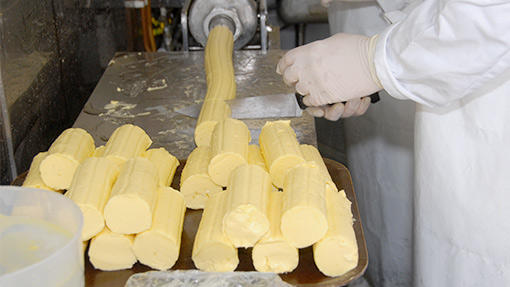Russia food import ban hurts UK dairy companies

British dairy companies have already lost business because of Russia’s ban on Western food imports.
Co-operative Arla has said it has stopped production of butter and cheese for the Russian market, which accounts for £107m of sales a year and 1.3% of the company’s annual revenue.
Belton Cheese had to turn around two containers of cheese on the way to Russia.
The Shropshire firm has been exporting there for three years, selling about 100t of cheese a year.
Managing director Justin Beckett said the cheese would have to find a home in one of the company’s other trade destinations.
See also: Vladimir Putin bans Western food imports
“[The Russian business] was growing really nicely and predicted to see a growth to 300-400t in the next three years,” he said.
“It is really disappointing for everyone here and frustrating for others exporting there.”
Mr Beckett said it was quite something for the firm to have gained market access as there was an “enormous cost” in exporting to Russia, with extra hygiene testing required by the country’s authorities.
The UK sold about £5.4m of dairy products to Russia last year, compared to £1bn from the whole EU.
Industry experts have said that while most British dairy businesses should not be affected directly, the extra product available around the world may add pressure to an already struggling market.
A spokeswoman from trade association Dairy UK said it was working out the full impact of Moscow’s announcement.
“We are liaising with the UK government, the EU and other industry stakeholders to understand the implications of Russia’s decision,” she said.
On Thursday, Russian prime minister Dmitry Medvedev announced the year-long ban on imports of fruit, vegetables, meat, fish, milk and dairy from the EU, USA, Australia, Canada and Norway would start immediately.
The move was in retaliation to financial and trade sanctions put in place by the EU and USA after the federation’s annexation of Crimea and support for Ukrainian rebels.
Russia is the Continent’s second biggest destination for food and drink exports.
As well as dairy products, EU sales to Russia included €769m (£612m) of vegetables, €1.3bn (£1bn) of fruit, €969m (£770m) of pork, €110m (£87m) of beef and €78m (£62m) of poultrymeat.
Russia is also the EU’s second biggest trading partner for food and drink.
EU agricultural commissioner Dacian Cioloș said he was confident the resilient farm sector would shift quickly to new markets and opportunities.
“There must be support to help this transition happen smoothly,” he said. “This requires a joined-up, European response.
“I want to underline that the Common Agricultural Policy has new and modernised tools to stand by [farmers], as soon as is needed, including our crisis reserve, which is already available now.
Mr Cioloș said he would form a taskforce to analyse the ban’s effect sector-by-sector and had called a meeting of senior farming experts from across Europe to be held next week.
